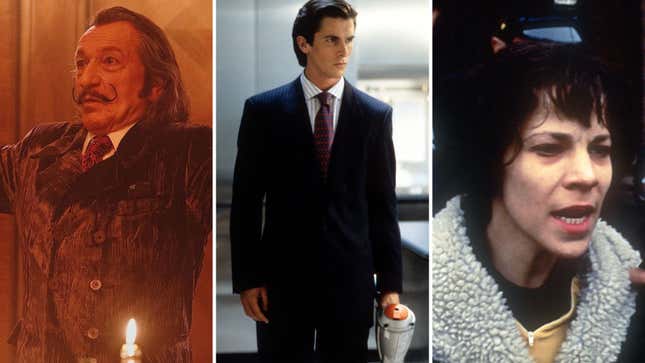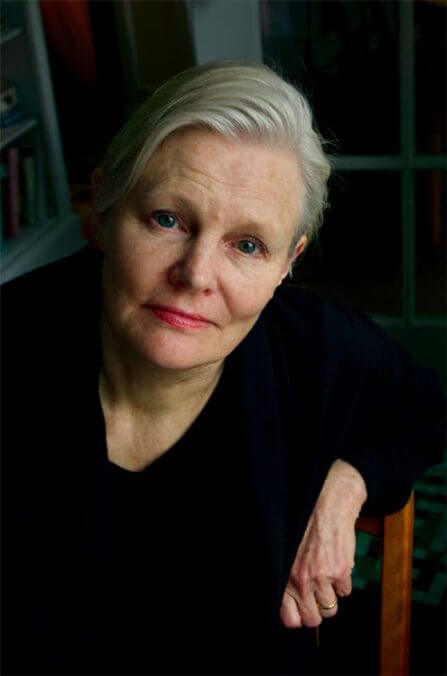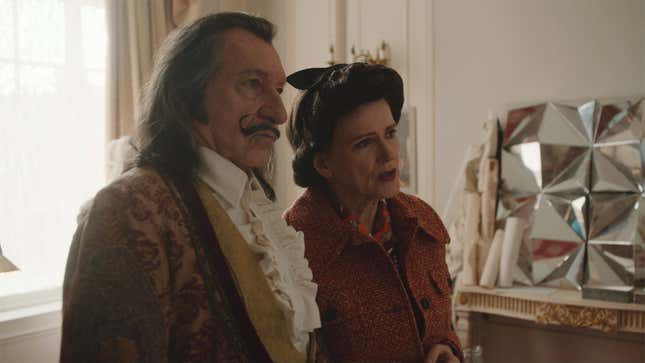‘Dalíland’ Director Mary Harron Explains Why She Keeps Making Movies About ‘Awful’ People
The filmmaker also talked to Jezebel about Dalí's life in '70s New York, portraying his muse Amanda Lear as trans, and working with Ezra Miller.
EntertainmentMovies

Mary Harron doesn’t like to call her movies “biopics,” but she does like making films about real-life people. Her first movie was 1996’s I Shot Andy Warhol, a depiction of the failed attempt by SCUM Manifesto’s Valerie Solanas to assassinate Andy Warhol. Movies about Bettie Page (2005’s The Notorious Bettie Page), Anna Nicole Smith (2013’s The Anna Nicole Story), and Charles Manson (2018’s Charlie Says) followed, as did American Psycho, which didn’t qualify as anyone’s definition of a biopic but kind of feels like it, as few fictional characters occupy a space as large in pop culture iconography as Patrick Bateman.
Harron’s latest is Dalíland (out Friday), a portrait of a late-career Salvador Dalí (Ben Kingsley) in ‘70s New York City. He’s surrounded by a crew of loved ones, fellow partiers, and hangers-on, including his wife Gala (Barbara Sukowa) and his muse Amanda Lear (Andreja Pejić). This world of forgeries, orgies, and casual sexual harassment is viewed through the eyes of James (Christopher Briney), a gallery assistant who enters Dalí’s world and quickly endears himself to the artist.
Over a Zoom with Jezebel, Harron discussed her new movie, working with Ezra Miller (who plays a young Dalí), portraying Amanda Lear as trans, and why she is so drawn to subjects that others deem “awful” people. A condensed and edited transcript of our conversation is below.
JEZEBEL: Dalíland is your fifth biopic.
MARY HARRON: Yeah. I mean, I don’t think of any of them as biopics, really. Maybe The Anna Nicole Story was kind of more traditional. But I feel like they’re always focusing on some real-life aspect rather than trying to tell a whole life. I think this is very true of this one. It’s not trying to tell the whole life and it’s not trying to sort of explain [Dalí’s] part in art history. This is much more a portrait of him in a twilight time, a very unlikely time, because he’s in New York and it’s ‘70s culture, which, weirdly enough, he’s sort of fitting in with. And there’s this crisis with his marriage. So it’s just really quite a specific time frame.
It feels very much like a period piece in that respect. It also strikes me that by profiling him post-peak, you get to see more vulnerability there. At another period, his grandeur might come off as justified, but here we get to look at his self-concept and the reality side-by-side and with clarity.That was what I wanted. First, I didn’t want to do another biopic about an artist. And then my husband, John [C. Walsh], who wrote the script, wrote me a memo saying that this is about fear of death, a man terrified who’s dancing as fast as he can to keep away these specters of death and aging. And the idea of this swirl of parties and people and entourage is to keep what was always there from coming for him. He was so eccentric, and it’s very hard to ever understand genius, but in this aspect of the fear of aging he’s completely mortal and completely human and relatable to us.
Was it tricky at all to set something in the ‘70s when the cultural mores were different, especially around sex and consent, just knowing that a contemporary audience with its own ideas would be viewing this?
I’m sure people will disapprove of some of the behavior, but, I was there in the ‘70s. This is also a personal thing. I moved to New York as a young person in 1975. And so I remember the atmosphere, how exciting it was. I’m a great believer in not censoring the past. I like trying to present the past as the past and not do a wistful, comic version of the past.
-

-

-

-

-

-

-

-

-

-

-

-

-

-

-

-

-

-

-

-

-

-

-

-

-

-

-

-

-

-

-

-

-

-

-

-

-

-

-

-










































